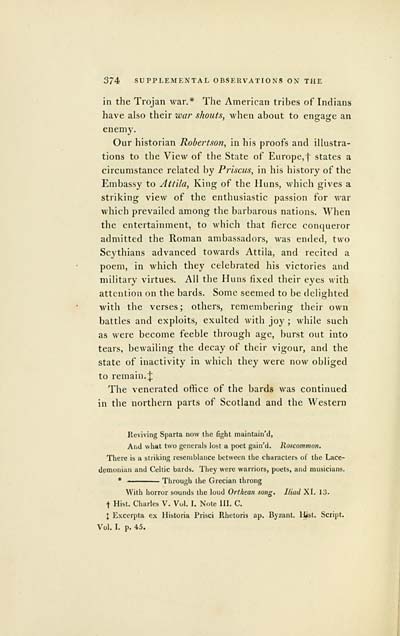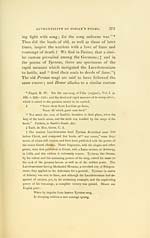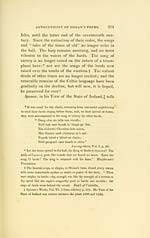J. F. Campbell Collection > Poems of Ossian > Volume 3
(386)
Download files
Complete book:
Individual page:
Thumbnail gallery: Grid view | List view

374 SUPPLEMENTAL OBSERVATIO NS ON THE
in the Trojan war.* The American tribes of Indians
have also their ìvar shouts, when about to engage an
enemy.
Our historian Robertson, in his proofs and iUustra-
tions to the View of the State of Europe,| states a
circumstance related by Priscus, in his history of the
Embassy to Attila, King of the Huns, which gives a
striking view of the enthusiastic passion for war
which prevailed aniong the barbarous nations. When
the entertainment, to which that /ìerce conqueror
admitted the Roman ambassadors, was ended, two
Scythians advanced towards Attila, and recited a
poem, in which they celebrated his victories and
niilitary virtues. All the Huns fixed their eyes with
attcntion on the bards. Some seemed to be delighted
with the verses; others, remembering their own
battles and exploits, exulted with joy ; while such
as were become feeble through age, burst out into
tears, bewailing the decay of their vigour, and the
state of inactivity in which they were now obliged
to reniain.;};
The venerated ofiice of the bards was continued
in the northern parts of Scotland and the Western
Reviving Sparta iiow tlic figlit maintaiii'd,
And what two generals lost a poet gain'd. Roscommoii.
There is a stril^ing reseniblaiice bctween the characters of ihe Lace-
demonian and Celtic bards. They were warriors, poets, and musicians.
* — — — Through ihe Grecian throng
With horror sounds the loud Orthean song. Iliad XI. IJ.
t Hist. Charles V. Vol. I. Note 111. C.
X Excerpta e.\ Historia Prisci Rhetoris ap. Byzant. lUst. Script.
Vol. 1. p. 45.
in the Trojan war.* The American tribes of Indians
have also their ìvar shouts, when about to engage an
enemy.
Our historian Robertson, in his proofs and iUustra-
tions to the View of the State of Europe,| states a
circumstance related by Priscus, in his history of the
Embassy to Attila, King of the Huns, which gives a
striking view of the enthusiastic passion for war
which prevailed aniong the barbarous nations. When
the entertainment, to which that /ìerce conqueror
admitted the Roman ambassadors, was ended, two
Scythians advanced towards Attila, and recited a
poem, in which they celebrated his victories and
niilitary virtues. All the Huns fixed their eyes with
attcntion on the bards. Some seemed to be delighted
with the verses; others, remembering their own
battles and exploits, exulted with joy ; while such
as were become feeble through age, burst out into
tears, bewailing the decay of their vigour, and the
state of inactivity in which they were now obliged
to reniain.;};
The venerated ofiice of the bards was continued
in the northern parts of Scotland and the Western
Reviving Sparta iiow tlic figlit maintaiii'd,
And what two generals lost a poet gain'd. Roscommoii.
There is a stril^ing reseniblaiice bctween the characters of ihe Lace-
demonian and Celtic bards. They were warriors, poets, and musicians.
* — — — Through ihe Grecian throng
With horror sounds the loud Orthean song. Iliad XI. IJ.
t Hist. Charles V. Vol. I. Note 111. C.
X Excerpta e.\ Historia Prisci Rhetoris ap. Byzant. lUst. Script.
Vol. 1. p. 45.
Set display mode to: Large image | Transcription
Images and transcriptions on this page, including medium image downloads, may be used under the Creative Commons Attribution 4.0 International Licence unless otherwise stated. ![]()
| Early Gaelic Book Collections > J. F. Campbell Collection > Poems of Ossian > Volume 3 > (386) |
|---|
| Permanent URL | https://digital.nls.uk/81286384 |
|---|
| Description | Vol. III. |
|---|---|
| Shelfmark | Cam.1.b.5 |
| Additional NLS resources: | |
| Attribution and copyright: |
|
| Description | Volumes from a collection of 610 books rich in Highland folklore, Ossianic literature and other Celtic subjects. Many of the books annotated by John Francis Campbell of Islay, who assembled the collection. |
|---|
| Description | Selected items from five 'Special and Named Printed Collections'. Includes books in Gaelic and other Celtic languages, works about the Gaels, their languages, literature, culture and history. |
|---|

